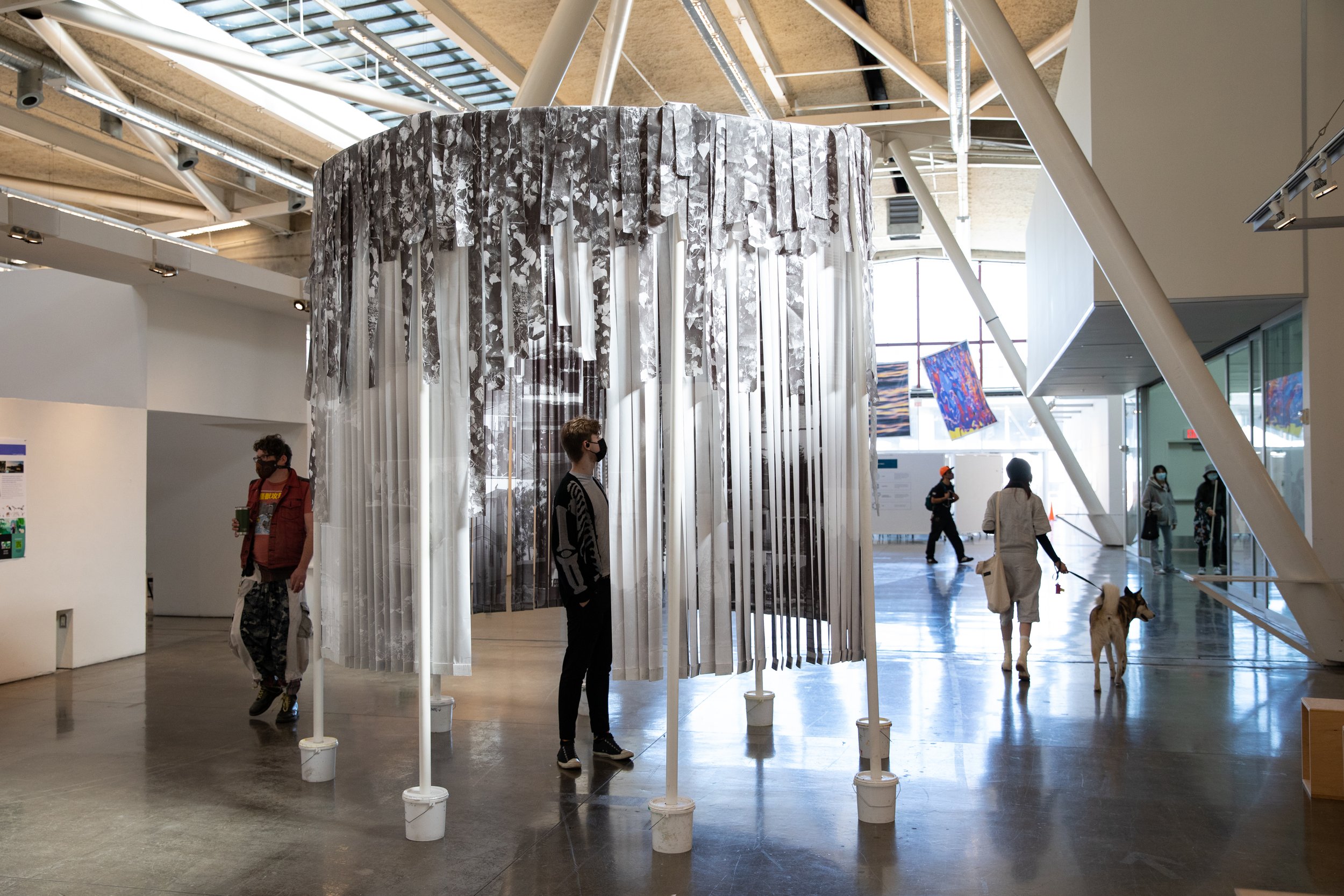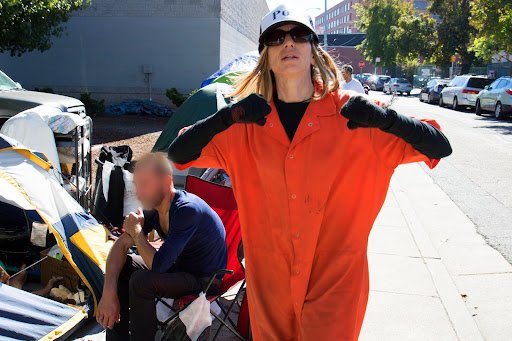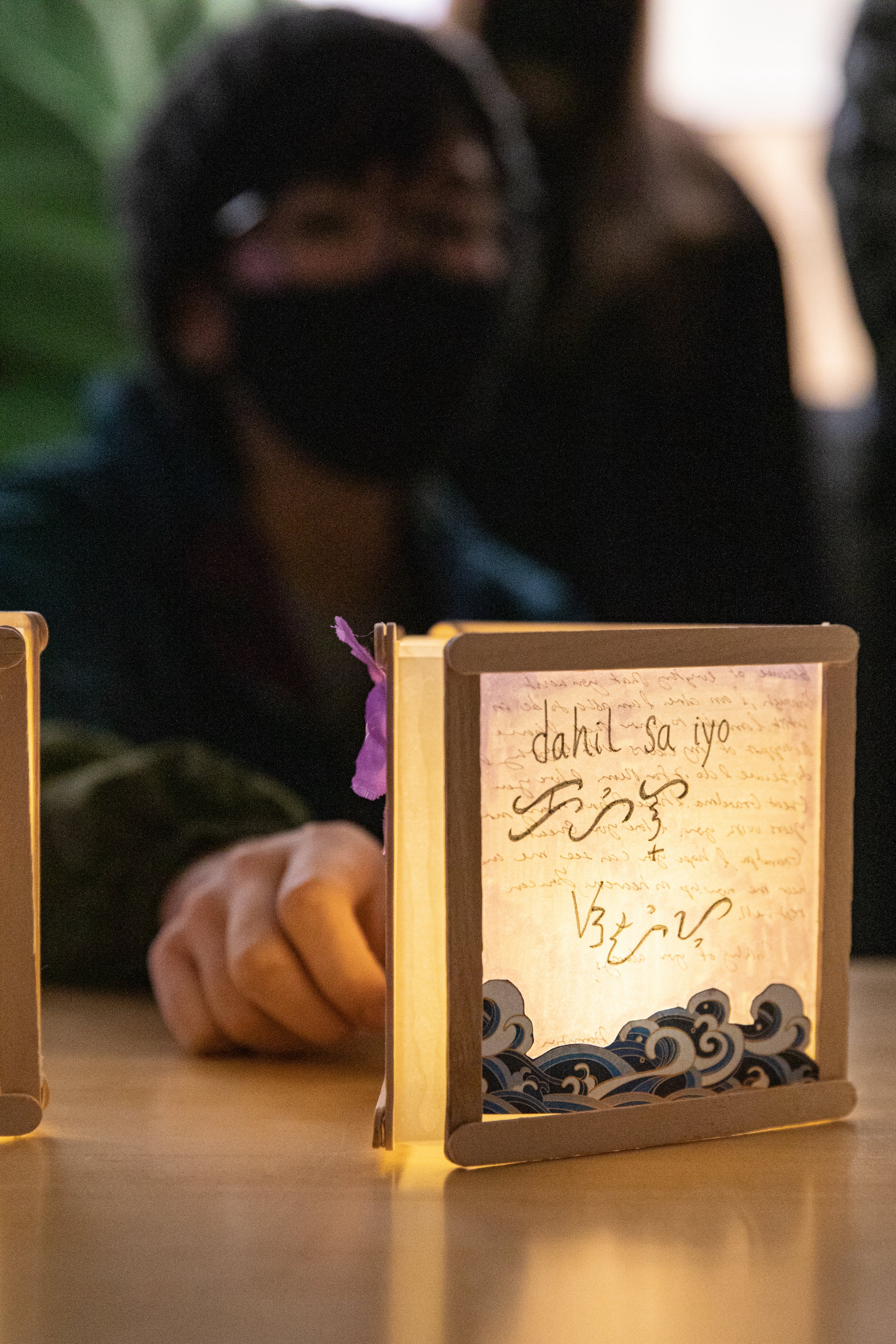FLUID
MUTUALISM
The 2021–2022 CCA@CCA theme, Fluid Mutualism, was selected by Faculty Coordinator Professor V to investigate intergenerational symbiotic relationships, networks, and strategies expanding within different communities, species, disciplines, and territories. The theme reflects her deep interest in connections between ecology, activism, immigration, art making, and performance, and was inspired by the ancestral practices and philosophies of Indigenous people from around the world.
The Fluid Mutualism program centered Indigenous knowledge and technology by focusing on four of the five pillars of the Communal Flower, a model for understanding communality in the ancient philosophy and daily practice of various Indigenous nations in southern Mexico: land, communal responsibility, assembly and joy. The 2021–2022 Creative Citizens Series explored each of these four pillars in depth through commissioned writings published throughout the academic year and a curated series of public programs, including a weeklong symposium.
Shreya Shankar (MArch 2023) installs Flow State Pavilion at the CCA@CCA Fluid Mutualism Symposium, March 2022. Photo by Nicholas Lea Bruno.
FACULTY COORDINATOR
Professor V
The 2021–2022 CCA@CCA Faculty Coordinator was Vreni Michelini-Castillo (she/they/elle), Adjunct II Professor, Critical Ethnic Studies Program, also known as “Professor V.” Professor V was born in Guanajuato, Mexico. They studied visual arts, craft and art history at Virginia Commonwealth University and art practice and ethnic studies at UC Berkeley. They work as a transdisciplinary cultural producer and educator at CCA and SFSU. Their practice involves art, performance, music, hip hop, writing, cultural organizing, traditional ecological knowledge, and danza Mexica Chichimeca (mihtotiliztli).
STUDENT FELLOW
Niv Rajendra
Niv Rajendra (MFA Fine Arts 2022) is a socially engaged artist and certified Ayurvedic Practitioner. Through her work she explores how the renewal and reinstatement of Indigenous spiritual knowledge can repair damaged relationships in human communities, between humans and the land, and between living and non-living entities. Originally from New Delhi and Mangalore, India, she has lived and worked across the world.
CAMPUS ACTIVATION
Symposium
The CCA@CCA Fluid Mutualism Symposium took place from March 1st through 4th, 2022, and included an exhibition and weeklong series of talks, workshops, teach-ins, performances, and activations that exemplified assembly and communal responsibility—two of the five pillars of the Communal Flower. Its programming served as a meditation on the importance of water and everything it teaches us about how to move through our brief time on Earth. Together, participants explored how the CCA community, the school and everything constructed within it can be an example of fluidity, transformation, and clarity. The symposium encompassed both virtual and in-person gatherings, marking a return to on-campus interactions for the CCA community.
CURRICULUM CONNECTION
Commissioned Writings
“We Are Like Bees,” a conversation with teacher, dancer, and drummer Kwesi Anku.
“We are like bees. Bees, they make honey, they eat the honey themselves, right? So we make the music and we consume it ourselves as the communal thing. It’s as simple as that, we don’t make music for anybody else.”
“La Milpa, the Origin of the Communal Flower” by Parménides Rodríguez (The Shadow), translated from Spanish by Professor V.
“To live, to feel oneself in collective, is to be in harmony with mother nature, who is the end and beginning of our existence.”
“Joy: Reparations and Access” by Tiny with editor’s notes by Niv Rajendra.
“Joy is knowing that even in the thick of extraction and ignorance is Mama Earth’s divine intelligence, giving strength and stamina to those leading the work in decolonization and collective liberation. Without this, the communal flower would slowly but surely wilt and die.”
SPOTLIGHTED PROJECT
Organic Architecture
On September 22, 2021, CCA@CCA Faculty Coordinator Professor V hosted an online conversation with renowned Mexican architect Javier Senosiain. The discussion focused on organic architecture and the connection between natural and built environments. Senosiain shared insights into the design process of his architectural creations, which drew inspiration from fauna including sharks and nautili. The event, conducted in Spanish with live translation and ASL interpretation, motivated CCA students to break free from traditional architectural norms and incorporate ecological research into their creative practices. Bay Area saxophonist Howard Wiley provided lively musical interludes, adding an additional dynamic element to the conversation.
CURRICULUM CONNECTION
A Tribute to Those who Had to Cross Borders
Lydia Nakashima Degarrod (Senior Adjunct Professor, Critical Studies Program) received a CCA@CCA Faculty Grant to support student research into forced migration. The students in her Social Sciences course “Migrants, Exiles, Refugees” studied the displacement of over 80 million people due to war, persecution, climate change, and poverty. Class discussions and assignments focused on new formations of identity and emergent concepts of home and belonging shaped by the refugee crisis. Using grant funds, students created maps depicting refugees' routes from critical zones like Afghanistan, Syria, Central America, and Myanmar, for exhibition at the CCA@CCA Fluid Mutualism Symposium. Additionally, artist Na Omi Judy Shintani taught the students to craft remembrance lanterns to symbolically guide refugees in their journeys. The lanterns were lit during an intimate ceremony for the CCA community on March 1, 2022.












